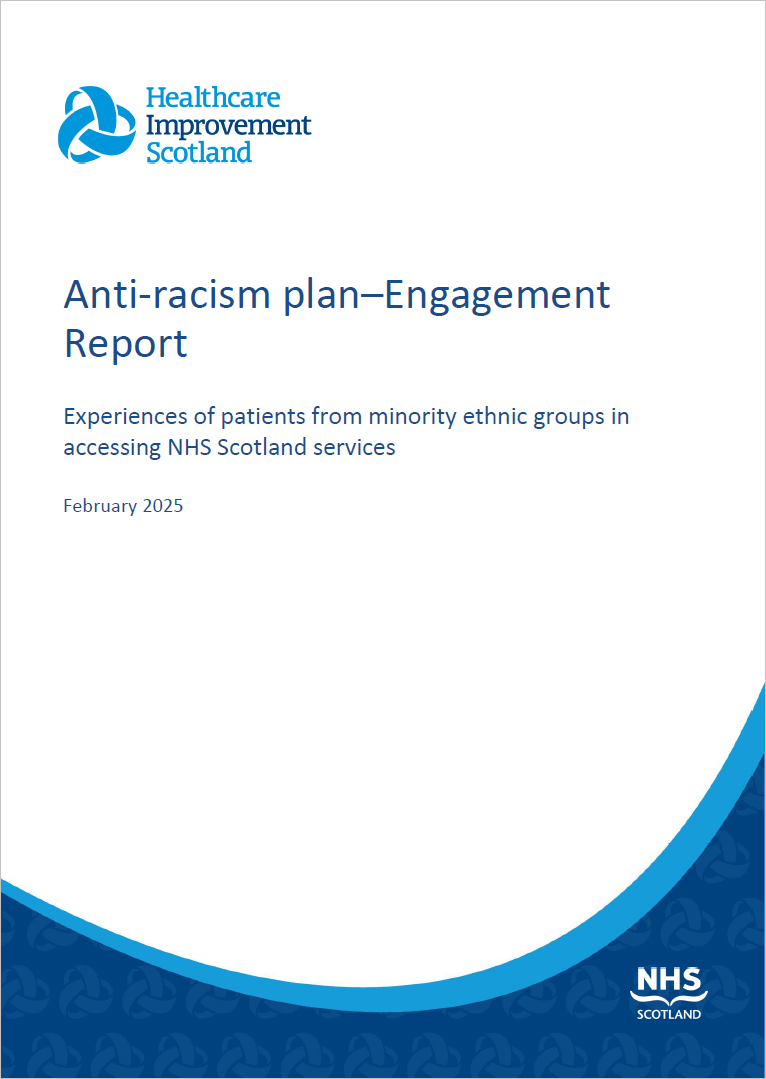Healthcare Improvement Scotland asked us to carry out a piece of focused engagement to help inform its anti-racism plan.
In March 2024, the Scottish Government asked all NHS Scotland organisations to develop their own anti-racism plan with input from stakeholders, including forums representing minority ethnic colleagues and minority ethnic communities themselves. Healthcare Improvement Scotland developed its plan alongside its staff Race and Ethnicity Network. We were asked to carry out some focused engagement to understand the experience of communities and ensure our plan makes a meaningful contribution towards addressing healthcare inequalities.
We worked over the last year to diversify our local community contacts including minority ethnic groups. We engaged with 16 people from a range of backgrounds to hear more about their recent experiences of NHS services and what matters to them.
We identified the following recommendations and actions that have been built into Healthcare Improvement Scotland's anti-racism plan.
Recommendation 1
Provide more education for NHS Scotland staff, including more awareness of unconscious bias – “I don't normally think it is a racism thing. I normally think it's lack of knowledge.”
What we’ll do: Healthcare Improvement Scotland’s anti-racism plan will include training and development, including for key staff groups who can make a difference in respect of their leadership and decision-making.
Recommendation 2
Drive forward person-centred care that considers the culture and language of the patient. This approach also needs to be carefully applied to people who do not speak English as their first language.
What we’ll do: We will share intelligence about the diversity of cultural needs patients may have when planning improvements in person-centred care. We will do this by capturing cultural considerations as part of our Equality Impact Assessments for new work. We will also encourage our staff to complete the NHS Scotland learning module on ‘Cultural Humility.’
Recommendation 3
Recruit NHS staff with refugee experience.
What we’ll do: As part of Healthcare Improvement Scotland’s anti-racism plan, we will commit to increase the number of colleagues with a minority ethnic background in our own workforce and to disrupt bias in recruitment by exploring how we can use more diverse interview panels.
Recommendation 4
Make more language translators available to support patient appointments.
What we’ll do: When carrying out community engagement we will identify where language translators can support people to participate; and we will work with our contacts to provide translation as needed. While the provision of interpreters for people receiving health and social care and treatment is outside Healthcare Improvement Scotland’s remit, we will share awareness with colleagues in the system about where language can be a barrier to accessing services. We will offer improvement support where it feels appropriate and possible for us to do so.
Recommendation 5
Use plain English as far as possible – “Can a diagnosis or treatment recommendation be explained without too much medical terminology?”
What we’ll do: We will continue to promote our policy of producing written information aligned with a reading age of 8 years.
Recommendation 6
Take time to ask patients about their symptoms, build a good understanding and ensure their understanding by answering questions.
What we’ll do: Healthcare Improvement Scotland is does not provide clinical services directly to patients and therefore our staff do not have individual clinical care conversations. We can however influence patient-facing services across NHS Scotland by promoting high quality person-centred care in all of our work. Examples of where we do this include:
- Excellence in Care Framework
- Right Decision Service
- What Matters To You
- Promoting the Care Experience Improvement Model
- Promoting the use of BRAN questions as well as shared decision-making and improved communication between patients and health professionals. This was also a recommendation in our Fourteenth Citizens' Panel report
Recommendation 7
Ensure that patients from minority ethnic communities know their rights in relation to healthcare.
What we’ll do: As part of Healthcare Improvement Scotland’s anti-racism plan we will use our community engagement structures to strengthen links with minority ethnic communities, including refugees, to ensure that diverse communities better understand their rights and can influence the health and care system. This will include signposting to NHS organisations that can provide support, such as NHS inform's information about the Charter of patients rights and responsibilities.
Recommendation 8
Build inclusive NHS cultures by listening to those with lived experiences – “It will be baby steps, but if it's heading in the right direction that's something."
What we’ll do: In addition to our staff training and community engagement activity described above, we will facilitate a peer support space for staff from minority ethnic backgrounds and convene a regular meeting space for anti-racism collaboration.
Recommendation 9
Encourage and support local engagement structures for refugees to use their skills and contribute to decision-making.
What we’ll do: As part of Healthcare Improvement Scotland’s anti-racism plan, we will strengthen links with minority ethnic, including refugee, communities.
Impact
Healthcare Improvement Scotland's anti-racism plan is available on its website.

